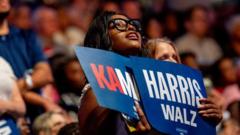Kamala Harris’s campaign is gaining traction among young women in battleground states like Michigan and Arizona. With issues such as abortion rights at the forefront, these voters are mobilizing in significant numbers, showing promise for Harris’s potential to turn the election tide.
Young Women Mobilize to Support Harris: A Crucial Shift in the 2024 Election

Young Women Mobilize to Support Harris: A Crucial Shift in the 2024 Election
In key battleground states, Kamala Harris is relying on the energized support of young women voters as election day approaches.
In the crucial battleground states of Arizona and Michigan, an impressive wave of young women voters is stepping up to the polls, signaling a potentially significant shift in the 2024 election landscape. On an unusually warm autumn day at the University of Michigan’s Ann Arbor, throngs of students eagerly lined up to cast their ballots at the early voting center. Among them was 20-year-old Keely Ganong, a third-year student thrilled to support Kamala Harris's campaign. "She’s just a leader I would look up to as a representative of our country," she shared.
Gender equality, particularly in the realm of abortion rights, is a topic that resonates deeply among these young voters. Lola Nordlinger, a friend of Ganong's, passionately articulated, "A woman’s choice is incredibly personal, and it should be no one else’s decision." With only days remaining until election day, Ganong noted that discussions around voting are prevalent on campus, with students convinced that "student voices are definitely going to make a difference."
Echoing this sentiment, Adrianna Pete, a 24-year-old volunteer educating peers on the democratic process, remarked, "I feel like a lot of women are rising up." Indeed, polls indicate that Harris is favored significantly by young women, leading by 30 points among those aged 18-29, as highlighted by a recent Harvard Institute of Politics survey. More tellingly, among college students, her lead stretches to 38 points, based on recent findings from Inside Higher Ed and Generation Lab.
With national and state-level polls revealing neck-and-neck competition, Harris counts on this young female demographic to show up in droves to secure her chances of winning. Hannah Brocks, 20, who recently participated in a Harris and Walz rally, has actively engaged in the campaign through her college's young Democrats club, focusing on grassroots efforts like door-to-door canvassing. "The empathy and love with which she speaks about people truly resonates," Brocks expressed.
Historically, elections have seen women vote in greater numbers than men, and early indications from exit polls suggest that this trend may continue, though analysts warn of the uncertainty regarding the political preferences of these voters. The dynamics become even more interesting when looking at racial breakdowns—Harris holds a notable 55-point advantage among non-white women under 30, while her edge among white women diminishes significantly; in fact, prior elections have shown white women leaning towards Trump.
Further complicating the political landscape is the long-standing challenge for Democratic candidates with non-college-educated women. Political analyst Evan Roth Smith noted that the most pivotal voters may not align neatly with conventional profiles. Despite a general trust in Republicans concerning issues like immigration and the economy, abortion rights could emerge as a defining issue that sways opinions.
In Arizona, the stakes are especially pronounced, as voters will decide on an amendment to protect abortion rights in the state constitution. Mary Jelkovsky, a local resident, believes this ballot measure will galvanize women to vote. Adorned in a blue sweatshirt that boldly states "vote with your vag," she articulated the personal impact of reproductive rights: "It’s crucial for us to have open discussions about these issues; they’re deeply personal."
For Harris, convincing Republican women to support her candidacy constitutes another key target. Some women, like Rebecca Gau, have shifted their political allegiance due to dissatisfaction with Trump's presidency, feeling that Harris embodies their perspectives as pragmatic American women. "Women are fed up," Gau stated in an interview. However, not all Republican women are swayed; members of the BBC's Voter Panel express hesitations, viewing Harris's stance on abortion as excessive.
With each passing day leading to the election, the mobilization of young women could prove pivotal in determining Harris's trajectory. As the struggle for control heats up, the political priorities of these voters—both key issues like abortion rights and broader concerns regarding representation—will shape the course of this election.
Gender equality, particularly in the realm of abortion rights, is a topic that resonates deeply among these young voters. Lola Nordlinger, a friend of Ganong's, passionately articulated, "A woman’s choice is incredibly personal, and it should be no one else’s decision." With only days remaining until election day, Ganong noted that discussions around voting are prevalent on campus, with students convinced that "student voices are definitely going to make a difference."
Echoing this sentiment, Adrianna Pete, a 24-year-old volunteer educating peers on the democratic process, remarked, "I feel like a lot of women are rising up." Indeed, polls indicate that Harris is favored significantly by young women, leading by 30 points among those aged 18-29, as highlighted by a recent Harvard Institute of Politics survey. More tellingly, among college students, her lead stretches to 38 points, based on recent findings from Inside Higher Ed and Generation Lab.
With national and state-level polls revealing neck-and-neck competition, Harris counts on this young female demographic to show up in droves to secure her chances of winning. Hannah Brocks, 20, who recently participated in a Harris and Walz rally, has actively engaged in the campaign through her college's young Democrats club, focusing on grassroots efforts like door-to-door canvassing. "The empathy and love with which she speaks about people truly resonates," Brocks expressed.
Historically, elections have seen women vote in greater numbers than men, and early indications from exit polls suggest that this trend may continue, though analysts warn of the uncertainty regarding the political preferences of these voters. The dynamics become even more interesting when looking at racial breakdowns—Harris holds a notable 55-point advantage among non-white women under 30, while her edge among white women diminishes significantly; in fact, prior elections have shown white women leaning towards Trump.
Further complicating the political landscape is the long-standing challenge for Democratic candidates with non-college-educated women. Political analyst Evan Roth Smith noted that the most pivotal voters may not align neatly with conventional profiles. Despite a general trust in Republicans concerning issues like immigration and the economy, abortion rights could emerge as a defining issue that sways opinions.
In Arizona, the stakes are especially pronounced, as voters will decide on an amendment to protect abortion rights in the state constitution. Mary Jelkovsky, a local resident, believes this ballot measure will galvanize women to vote. Adorned in a blue sweatshirt that boldly states "vote with your vag," she articulated the personal impact of reproductive rights: "It’s crucial for us to have open discussions about these issues; they’re deeply personal."
For Harris, convincing Republican women to support her candidacy constitutes another key target. Some women, like Rebecca Gau, have shifted their political allegiance due to dissatisfaction with Trump's presidency, feeling that Harris embodies their perspectives as pragmatic American women. "Women are fed up," Gau stated in an interview. However, not all Republican women are swayed; members of the BBC's Voter Panel express hesitations, viewing Harris's stance on abortion as excessive.
With each passing day leading to the election, the mobilization of young women could prove pivotal in determining Harris's trajectory. As the struggle for control heats up, the political priorities of these voters—both key issues like abortion rights and broader concerns regarding representation—will shape the course of this election.





















